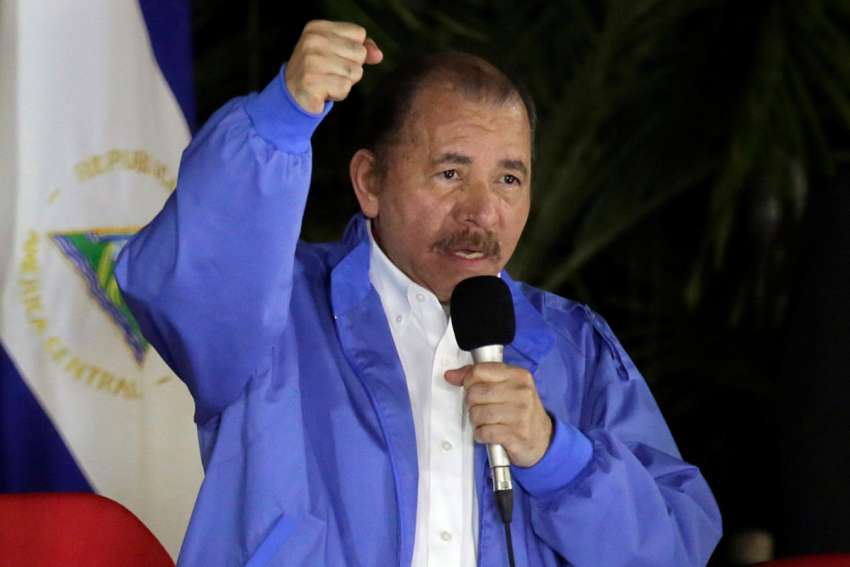The closures, announced Aug. 19 by the Interior Ministry, targeted religious and civic groups ranging from Protestant churches to the Rotary club to agricultural producer associations and even the national chess federation.
A source familiar with Nicaragua described the Aug. 19 actions as "an extraordinary effort by the Nicaraguan State to crush nongovernmental organizations across Nicaraguan society."
The attack from the increasingly totalitarian regime of President Daniel Ortega and his wife, Vice President Rosario Murillo, further eliminated civic spaces beyond their control, while further attacking freedom of worship.
The regime has closed at least 5,000 nongovernmental organizations and silenced independent media since 2018, when protesters took to the streets to demand the president's ouster -- only to be met with violence from police and paramilitaries.
The Aug. 19 closures especially targeted evangelical congregations, many of which were described as modest by independent media.
The assault also continued on the Catholic organizations, putting among the canceled religious orders: the Capuchin Friars Minor, Carmelite Sisters of the Divine Heart of Jesus, the Augustinian monks and nuns, Mercedarian Missionaries of Berriz, the Order of Cistercians of the Strict Observance (also known as "Trappist" Sisters), and the Brothers of Charity.
A pair of Salesian ministries were canceled: the Association of Salesian Cooperators, and the Association of Salesian Women. Other Catholic organizations losing their legal standing were Lumen Christi Catechist Missionaries, the Saint Pio Foundation, and the Association of Base Christian Communities.
The Caritas chapter in the Diocese of Granada was also shut down. The closure follows the Aug. 12 shuttering of the Caritas chapter in the Diocese of Matagalpa -- headed by exiled Bishop Rolando Álvarez. The source speaking with OSV News described the targeting of Caritas chapters as an attack as the regime "not wanting anyone but the state or anyone they consider reliable providing services to the citizenry."
The interior ministry alleged that the 1,500 NGO groups losing their registrations had failed to properly report their finances "for periods of between one and 35 years," along with "hindering" its "control and oversight" over such organizations. The Nicaraguan state effectively seizes the assets of nongovernmental groups that lose their legal standing.
The closure of so many churches and church organizations -- evangelical and Catholic -- underscored the suppression of religious life under the Sandinista regime.
An Aug. 19 statement from the Centro de Asistencia Legal Interamericano en Derechos Humanos described evangelical churches as "the last places where Nicaraguans can freely meet. Hence, the remaining NGOs still exercise freedom of association in a minimal way." The human rights group, Colectivo Nicaragua Nunca Más, reported that at least 21 evangelical pastors have been exiled, while three were denied reentry into the country. It has counted the legal cancellations of about 420 Christian organizations.
Nicaragua's evangelical congregations had been perceived as being less outspoken and not drawing the regime's ire until recently.
Catholic Churches have long been spied upon, according to sources, with priests having to watch their words, even during homilies. The regime has also forbidden expressions of faith, shuttering Catholic media outlets, canceling church charitable projects and halting processions and patron saint celebrations outside of church property.
Martha Patricia Molina, an exiled lawyer who tracks aggressions against the Nicaraguan Catholic Church, has counted 9,688 attempts at thwarting processions and religious activities since April 2018. Her latest report on church persecution was released Aug. 15 and documented 154 bishops, priests, deacons, seminarians and 91 nuns unable to work in Nicaragua, having fled the country, being forcibly exiled or simply denied reentry after traveling abroad.
Since 2018, nearly 250 priests, nuns, bishops and other members of the Catholic Church were forced out of the country, according to Molina's report -- with three bishops and 136 priests being expelled and arriving either in the United States or the Vatican.
At least 14 lay Catholics are currently imprisoned for religious reasons, Molina told news outlet Confidencial. More shortages have decimated dioceses such as Matagalpa and Estelí -- both headed by Bishop Álvarez -- along with the Diocese of Siuna, from which Bishop Isidoro Mora was exiled. Both Bishops Álvarez and Mora were exiled in January to the Vatican, along with 17 other churchmen.
The Diocese of Matagalpa has lost more than 80% of its priests, according to Molina, while the Dioceses of Estelí and Siuna have suffered significant losses of clergy.
"Because there are no priests in the area, it's the laity who are assuming certain roles, such as celebrating the word or visiting the sick to bring them communion," Molina said.
The cancellation of 1,500 NGOs came as two more priests were exiled to the Vatican. Fathers Leonel Balmaceda and Denis Martínez were sent to Rome on Aug. 17, according to independent Nicaraguan media.
The Society of Jesus, which was kicked out of Nicaragua in 2023, released a statement on the one-year anniversary of its prestigious Central American University being confiscated and later reopened as a Sandinista-aligned institution, calling for the government to "stop the repression, stop committing systemic human rights violations and release the political prisoners."
The Aug. 15 statement from the Jesuits' Central American province continued by urging the government to "accept the search for a rational solution, in which truth, justice, dialogue, academic freedom and the rule of law prevail."


